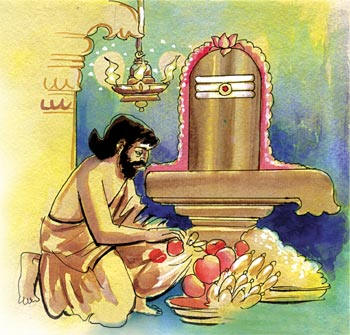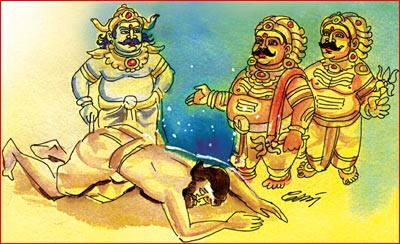Posted Date : 06:00 (07/03/2008)
·
·
·
கயவன் வேதநிதி மோட்சம் பெற்ற கதை!
The story of a rake who attained Mokṣa
by Vedic happenstance (by default, blind luck)
A lecher’s accidental liberation
கயவன் kayavaṉ
, n. < id. 1. Base, unworthy man
no-hoper.
/noh"hoh"peuhr/, n. a useless person from whom nothing can be
expected.


Paṇḍithar thinking of his son Vēthanidhi, boiled with anger. “What sin
did I do to have a son like this?” He heaved in agony and walked home in
an unsteady gait.
Paṇḍithar’s son Vēthanithi had no respect for parents, forgot what he
learned, always immersed in the pleasures of wine and woman. No matter
how much advice he received, it did not change him one bit. Besides
that, Paṇḍithar could not bear the ignominy he sustained in the palace because of his
son . What happened there?
The king praised and presented a diamond-studded ring to
Paṇḍithar, who exulted receiving it and gave it to his wife asking her
to keep it safe.
Vēthanithi stole the ring from his mother’s possession and gave it to
his favorite dancing girl (prostitute).
The dancing girl wore the ring when she came to the palace to participate in
an art performance. When
the king saw the ring, he was suspicious and subjected her to harsh
inquiry. Fearing punishment from the king, she told the truth. Flaming
with anger, he criticized Paṇḍithar harshly before the assembled
subjects.
‘The high regard the king had of
me was shattered by my son’s deed!’ The hatred he had towards his son
was exacerbated by the stealth of the ring, inside of him there was a
flood of anger.
“Where is he?” shouted Paṇḍithar with eyes blazing with anger. Hearing
the distressed voice of her husband, the wife came running to him.
“Swami… Whom are you talking about?”
“Who else? Your dear son Vēthanithi” Paṇḍithar narrated the incident to
his wife regarding his son.
“Don’t anguish yourself Swami. I will give Vēthanithi my advice.”
Hearing the words of his wife he laughed like thunder.
“We can milk a bull. Transformation of your son is beyond even a
dream. He cannot stay in my house even for a moment.” Paṇḍithar shouted.
On being ejected from the house, Vēthanithi went to the home of his
favorite whore. Even before his arrival, there was news about his
expulsion all over the town.
‘Hereafter, he is of no value to me.’ Entertaining such thought, she
chased him out of her house after raining down on him a torrent of words
of contempt.
Those harsh words pained Vēthanithi. He wriggled like a worm in loss of
respect. He wandered the street after street dazed without food or drink
and fell in a part of town in a swoon.
Waking up from his daze, he found the nightfall was imminent. ‘Harahara
Mahā
Dēva… Sambhō Śaṅkara
MahāDēva…
Namasivaya!’ People roared
streaming down the street. The bodies smeared with ash, the necks and
wrists with the Rudrākṣa Mālās (prayer beads) … fascinated him.
An old man was passing by him. He asked him, “Sir, what is special
today? Where are these people going?”
The man saw and took a measure of him up and down said, “OK… Are you not
aware of the celebration? Today is Mahā Śivarātri, an auspicious day.”
Vēthanithi having taken refuge in the bosom of women, had no idea of
Śivarātri (The Great Night of Śiva).
“Śivarātri, what is it?”
‘Someone like this.’ So thinking and feeling sorry for him, the elder
explained to him all about the greatness of Śivarātri. “Śivarātri comes
in Māci month (Feb-Mar), Kṛṣṇa Pakṣa Sathurdasi Titi. It is special to
Śiva.
It is the day (night) of Viratam (vow) equal to receiving fruits such as
redemption (absolution) from 10 million Brahmicides (killings of Brāhmaṇās),
benefits from 1000 Aśvamēdha
(horse sacrifices). “This day being that great, we seeking the grace of
Mahēṣa;
go to the
Śiva
temple nearby.”
Vēthanithi was joyous hearing those words. He walked fast towards the
temple.
In the temple, the preliminary Pūja
was over. The deity was bathed in clean water, seated on the golden
pedestal and decorated with flowers such as lotus, karavīram
(Sweet Oleander),
sathapaththiram (Lotus with 1000 petals) … Before the deity, there were
plates with rice and vegetables. Vēthanithi casing his surroundings
tiptoed into the Sanctum Sanctorum.
Inside the light was dim. He tore a piece of cloth from his loincloth.
He rolled it into a wick and lighted it. The lighted wick illuminated
the premises, he pilfered the food and parceled it in his torn cloth and
exited the premises quickly.
The guards on duty noticed it and chased him.
Vēthanithi
continued running paying no attention to them.
The guards unable to pursue him took an aim at him with their arrows.
Vēthanithi emitted his last hurrah and died. The messengers of Yama
lying in wait prepared to take him to the Netherworld.
The Śiva Gaṇas (minions of Śiva) stopped them to proceed any further and
said, “Minions of Yama, cease and desist. Emperumāṉ, the Lord of three
cities who set them on fire and the Lord with no beginning and no end
has ordered this man brought to Kailās.”
The messengers of the god of death said in exasperation, “Forgive us,
Śiva Gaṇas. Your speech is wondrous. What merit has he done to deserve
Kailās? Though educated in Vedas, he chose to forget them. He had no
respect for his parents. He was a drunk and a womanizer. Is he the
candidate for Kailās?”
The
Śiva Gaṇas said, “What you say is true. He observed without awareness fasting on
Śivarātri by force of peculiar circumstances. Not only he received Darśan of Siva
but also performed waving of lights as a matter of meritorious deed.
Transcending all this, he gave up his life on this auspicious day. That
is the reason why he received this lucky break to go to
Śivalōkam.”
Understanding the logic from the
Śiva Gaṇas, the minions of Yama stepped aside and Vēthanithi was taken to
Śivalōkam.
Besides, Vēthanithi took birth as the king of Kaliṅga country, and lived
in luxury, comfort and joy.
Though he was a
hard-core sinner, did you notice the boon Vēthanithi obtained by
accidental and unintentional fasting on the Śivarātri day? You should
not assume that you can be a sinner-in-chief all your life and yet
attain liberation just by fasting only on Śivarātri.
If the fruits
are extraordinary for an accidental and unintentional observance of fast,
think of the benefits you will accrue by loving and worshipping Śiva and
appreciating the greatness of Śivarātri.
Let us pay homage to and seek refuge at Śiva’s feet.
